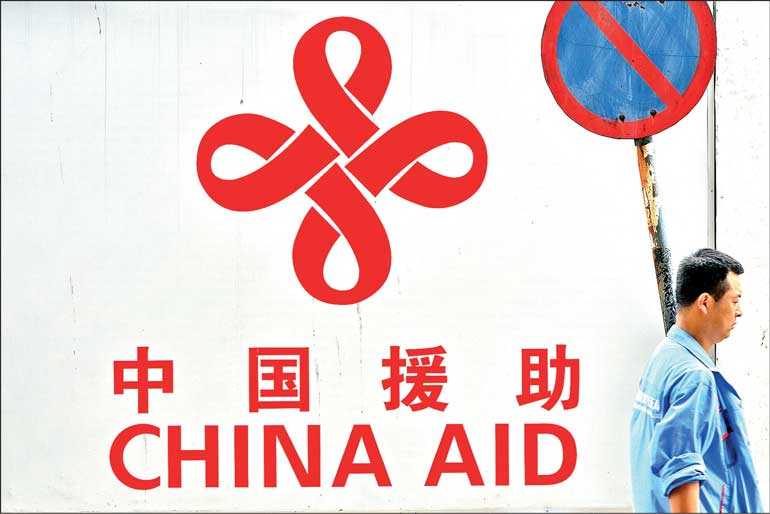Thursday Feb 19, 2026
Thursday Feb 19, 2026
Wednesday, 7 April 2021 00:00 - - {{hitsCtrl.values.hits}}

China’s financial and economic penetration into Sri Lanka reinforces her soft colonisation of the country. It is safe to say that China would even risk a hot war with any power to save her Sri Lankan foothold – Pic by Shehan Gunasekara
 The UNHCR resolution against Sri Lanka, which was passed in Geneva with 22 countries in favour, 11 against and 14 abstentions, has been sold domestically, as a victory by the Foreign Minister, who deserves a medal for demonstrating how to lie with statistics.
The UNHCR resolution against Sri Lanka, which was passed in Geneva with 22 countries in favour, 11 against and 14 abstentions, has been sold domestically, as a victory by the Foreign Minister, who deserves a medal for demonstrating how to lie with statistics.
Another Professorial Minister said that the resolution was not binding on Sri Lanka, and President Gotabaya Rajapaksa with his characteristic bravado reiterated the Minister’s expertise and said that Sri Lanka is an independent country and that it need not worry about UNHCR.
However, those who are veterans in international affairs and involved in negotiations with UN and its agencies have wisely cautioned the regime not to overlook the resolution’s seriousness and its implications in failing to do so, particularly in relation to trade and investment, without which the country cannot get out of the perilous economic situation it is caught in at present.
Between that resolution, which seeks to monitor developments in Sri Lanka over the next 12 months regarding accountability for war crimes, human rights violations and positive measures towards reconciliation, and the more recent telephone conversation between the President and his counterpart in China, Xi Jinping, in which the former thanked latter’s support in Geneva and China’s assurance to help Sri Lanka financially, technologically and economically, lies a stark reality.
It is a reality that allows the regime to choose between adherence to UNHCR resolution, which would enable the regime to reconcile with the minorities and give a chance to peace and stability to prevail at home – a sine qua non to achieve the President’s Vistas of Prosperity and Splendour – and stealthy recolonisation of the country by China, through financial penetration, economic assistance and political influence.
Importance of reconciliation
It was the continuous failure to reconcile with the Tamil minority that is at the bottom of all troubles in Sri Lanka since independence. Without going into the blame game for this failure, historical facts must be accepted. Had the language issue been resolved at the beginning, all those riots occurred subsequently, in 1958, 1977, 1981 and 1983, the 25-year murderous civil war and the consequent exodus of skilled and hardworking Tamils to the West, would have been avoided.
Periodic violence retarded economic development, and the civil war buried the country in irredeemable debt. Neighbouring countries that were once far below Sri Lanka in economic status are now forging ahead, and the country is driven to go with a begging bowl to Bangladesh, for a currency swap.
In spite of this historic reality, successive regimes that came to power did not seem to have realised the importance of reconciliation for economic and social development of this country. Instead, the current regime made the situation worse by marginalising and antagonising the most entrepreneurial community in the country, Muslims. This latter act was in a sense the immediate provocation for UNCHR to act.
There is no argument in that the UN and its various agencies are deliberate creations by former colonial powers to continue with their domination over the countries they lost, even though those colonies were allowed to regain their independence in political terms. Western countries like US, Britain and France are past masters in human rights violations. Now they are accusing China of violating human rights of Uighur Muslims, after ignoring that problem for the last two years and more, because these powers knew that their own economic prosperity depended very much on the economic growth of China.
Who can hold the US accountable for its human rights violations in Vietnam, Cambodia, Afghanistan, and Iraq? Will France ever take responsibility for its violations in Algeria and compensate the victims? What about Britain’s collusion with US in Afghanistan and Iraq, let along Britain’s sordid human rights record in India? These are indisputable facts of history. Yet, the reality is that these powers have succeeded in manufacturing a so-called World Order in which they continue to hold sway over international affairs. Small nations like Sri Lanka do not have the necessary wherewithal to counter their machinations and power play. The Cold War has ended, and shrewd diplomacy is the only instrument left for small countries to reap any benefit from this unjust World Order.
 Can the regime really ignore the resolution?
Can the regime really ignore the resolution?
Unfortunately, Sri Lanka’s diplomatic blunders in Geneva by sending the wrong persons to argue and solicit support for its case on the one hand, and the autocratic style of governance that continues to discriminate against minorities on the other, made the country’s position vulnerable, and hence the inevitable defeat. Can the regime really ignore the resolution?
Non-compliance could adversely affect the country’s economy. For example, nearly one-third of Sri Lanka’s exports go to EU. One of the incentives provided by EU is its General Scheme of Preferences and tariff concessions. These may be withdrawn which would spell disaster to Sri Lanka’s national income, trade balances, and ultimately, people’s living conditions.
Not only that, the West could exert pressure on certain Arab nations to impose selective restrictions when trading with and investing in Sri Lanka. There may be targeted sanctions against VIPs and freezing of their foreign assets. All that will certainly affect much needed foreign investment particularly from Europe. All that would precipitate a rapid depreciation of the rupee, which is the last thing that the country would want.
Counting on China’s support
However, the regime may be counting on China’s support in case these economic difficulties were to eventuate. Of course, China would be too willing to help. Even now, if the regime would quietly request China to convert that $1.5 billion currency swap to a medium or long-term loan, China would not say no.
However, the local regime should understand the geo-strategic agenda of that rising colossus. In its race for world domination, China does not conquer and control other countries with military occupation and bases as US does, but through financial largesse and technological and economic assistance. The One Belt Road strategy with String of Pearls acquisitions in the Indian Ocean is the chef route to achieve China’s ultimate objective of world domination. The size of China’s economy, according to one calculation, has already overtaken that of US.
Sri Lanka is strategically located along this route, and the China-Pakistan Economic Corridor (CPEC), which would now include Sri Lanka and become a CPSLEC is meant to strengthen this vital route. Already, Hambantota Port has become one of China’s semi-permanent Sri Lankan assets. With the proposed Port City Development, Colombo may soon have China Town. China’s financial and economic penetration into Sri Lanka reinforces her soft colonisation of the country. It is safe to say that China would even risk a hot war with any power to save her Sri Lankan foothold.
Will the Central Bank Governor reveal to the public the extent of Chinese total investment in Sri Lanka? Also, will the Census and Statistics Department publish its latest data on how many Chinese are living in Sri Lanka with dual citizenship? It was not without significance that sign boards with Chinese characters appeared recently at a railway station before they were removed. Colombo, Hambantota, Kandy and Puttalam Districts have already seen significant concentration of Chinese.
Unlike Zheng He, the Chinese Muslim eunuch admiral’s land war against the Kotte Kingdom in 14th century, which was a short-term foray, Xi Jinping’s financial penetration and economic assistance and political influence will trap Sri Lanka for generations to come. Is this the price that the Rajapaksa regime prepared to pay for its intransigence on reconciliation?
Contrary to what the President, his subservient cabinet, Viyath Maga advisers and political bhikkus advocate, reconciliation with democratisation is the cheapest route to achieve prosperity and splendour. It is also a guarantor of national security.
(The writer is attached to the Murdoch University, Western Australia and Voice of Democracy, Australia.)